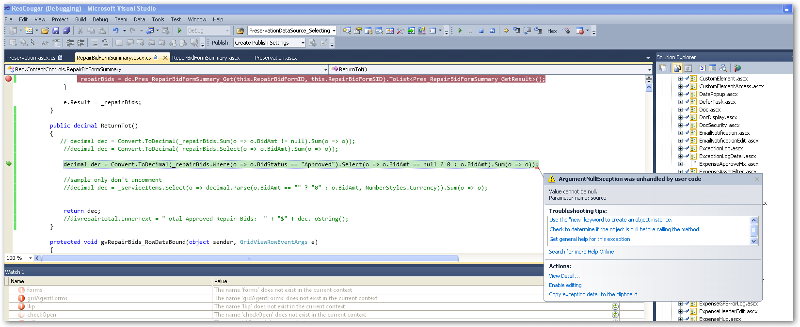LINQ syntax - where condition?
decimal dec = Convert.ToDecimal(_repairB
if I wanted to filter this by "o.Status = "Approved" so that only bid amounts that are approved get totalled...what would be the syntax?
if I wanted to filter this by "o.Status = "Approved" so that only bid amounts that are approved get totalled...what would be the syntax?
decimal dec = Convert.ToDecimal(_repairB
ASKER
That looks correct to me.
If you don't mind helping me out, I keep getting:
value cannot be null
I tried to make provisions for this by adding this:
o.BidAmt == null ? 0 : o.BidAmt
but I must either be doing that wrong or the problem is elsewhere...

If you don't mind helping me out, I keep getting:
value cannot be null
I tried to make provisions for this by adding this:
o.BidAmt == null ? 0 : o.BidAmt
but I must either be doing that wrong or the problem is elsewhere...
decimal dec = Convert.ToDecimal(_repairBids.Where(o => o.BidStatus == "Approved").Select(o => o.BidAmt == null ? 0 : o.BidAmt).Sum(o => o));
ASKER
Does this make sense?
decimal dec = Convert.ToDecimal(_repairB
can you do multiple "WHERE"'s like that?
decimal dec = Convert.ToDecimal(_repairB
can you do multiple "WHERE"'s like that?
do you know what is actually null?
you can try to check every level of that object for null
o=> o == null && ....?
also is it possible that the bidstatus is null? you might want to check for null in the where clause as well.
you can try to check every level of that object for null
o=> o == null && ....?
also is it possible that the bidstatus is null? you might want to check for null in the where clause as well.
you can combine those two where clauses into one with &&
ASKER
null means "has never had a value" right?
[EDIT]
In other words, null is not 0, "0" or ""
[EDIT]
In other words, null is not 0, "0" or ""
I thought BidAmt was a string? You can't mix types when using the conditional operator. Change the zero to a string:
decimal dec = Convert.ToDecimal(_repairBids.Where(o.Status == "Approved").Select(o => o.BidAmt == null ? "0" : o.BidAmt).Sum(o => o));ASKER
>> also is it possible that the bidstatus is null?
I supposed it could happen. Better to be safe. I'll check on that...
I supposed it could happen. Better to be safe. I'll check on that...
ASKER
>>>>I thought BidAmt was a string? You can't mix types when using the conditional operator. >>>>Change the zero to a string:
in one result it WAS indeed a string.
in another it is an actual decimal.
Let me recheck that....
in one result it WAS indeed a string.
in another it is an actual decimal.
Let me recheck that....
ASKER
This line compiles fine, but at runtime I still get the error: value cannot be null
What am I missing?
decimal dec = Convert.ToDecimal(_repairBids.Where(o => o.BidStatus == "Approved" && o.BidStatus != null && o.BidAmt != null).Select(o => o.BidAmt).Sum(o => o));What am I missing?
For readability's sake, I'd suggest breaking that logic up a bit (once the issue is corrected):
decimal dec;
var sum = _repairBids.Where(o.Status == "Approved")
.Select(o => o.BidAmt ?? "0")
.Sum(o => o);
dec = Convert.ToDecimal(sum);ASKER
Does it matter where the WHERE is called in the chain?
For example, does it matter if the WHERE is before the SELECT in LINQ?
For example, does it matter if the WHERE is before the SELECT in LINQ?
It can matter, but I don't think it does in this case.
What is the type of BidAmt?
What is the type of BidAmt?
ASKER
>>>What is the type of BidAmt?
It is:
decimal?
which I interpret to mean it can be a decimal value or a null value returned
It is:
decimal?
which I interpret to mean it can be a decimal value or a null value returned
ASKER
NOTE:
The exception message, if it helps at all:
The exception message, if it helps at all:
System.ArgumentNullException was unhandled by user code
Message=Value cannot be null.
Parameter name: source
Source=System.Core
ParamName=source
StackTrace:
at System.Linq.Enumerable.Where[TSource](IEnumerable`1 source, Func`2 predicate)
at Reo.ContentControls.RepairBidFormSummary.ReturnTot() in C:\R13\Reo\ContentControls\RepairBidFormSummary.ascx.cs:line 81
at Reo.ContentControls.Preservation.FillRepairBid() in C:\R13\Reo\ContentControls\Preservation.ascx.cs:line 266
at Reo.ContentControls.Preservation.FillPg() in C:\R13\Reo\ContentControls\Preservation.ascx.cs:line 113
at Reo.ContentControls.Preservation.Page_Load(Object sender, EventArgs e) in C:\R13\Reo\ContentControls\Preservation.ascx.cs:line 68
at System.Web.Util.CalliHelper.EventArgFunctionCaller(IntPtr fp, Object o, Object t, EventArgs e)
at System.Web.Util.CalliEventHandlerDelegateProxy.Callback(Object sender, EventArgs e)
at System.Web.UI.Control.OnLoad(EventArgs e)
at System.Web.UI.Control.LoadRecursive()
at System.Web.UI.Control.LoadRecursive()
at System.Web.UI.Control.LoadRecursive()
at System.Web.UI.Control.LoadRecursive()
at System.Web.UI.Page.ProcessRequestMain(Boolean includeStagesBeforeAsyncPoint, Boolean includeStagesAfterAsyncPoint)
InnerException: ASKER CERTIFIED SOLUTION
membership
This solution is only available to members.
To access this solution, you must be a member of Experts Exchange.
SOLUTION
membership
This solution is only available to members.
To access this solution, you must be a member of Experts Exchange.
ASKER
>>>Are you certain that _repairBids is not null when you get to that line?
Good news!!
Yes...this was the case. _repairBids was null. The entire thing.
I guess I didn't realize I needed to re-get everything from the data context.
Here is my final code:
Good news!!
Yes...this was the case. _repairBids was null. The entire thing.
I guess I didn't realize I needed to re-get everything from the data context.
Here is my final code:
public decimal ReturnTot()
{
decimal dec = 0;
using (PreservationDataContext dc = new PreservationDataContext())
{
_repairBids = dc.Pres_RepairBidFormSummary_Get(this.RepairBidFormID, this.RepairBidFormSID).ToList<Pres_RepairBidFormSummary_GetResult>();
if (_repairBids != null)
{
dec = Convert.ToDecimal(_repairBids.Where(o => o.BidStatus == "Approved" && o.BidStatus != null && o.BidAmt != null).Select(o => o.BidAmt).Sum(o => o));
}
}
return dec;
}ASKER
Nice work, all of you!